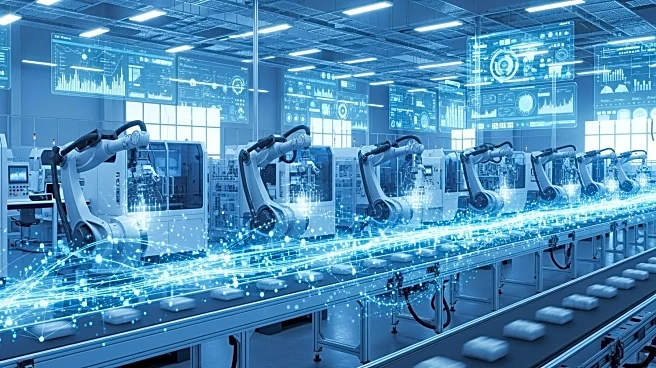What's Happening?
The manufacturing industry is undergoing a significant transformation with the adoption of autonomous data management systems. By 2026, data will play a pivotal role in manufacturing, evolving from a resource to an active force influencing real-time decisions
across the value chain. The integration of agentic AI systems allows data to organize itself, detect anomalies, and initiate corrective actions autonomously. This shift is driven by the need to manage the vast volumes of data generated by factories, including production logs, IoT sensor feeds, and compliance reports. AI agents are now responsible for cleaning, validating, and reconciling data, reducing downtime and ensuring decisions are based on accurate information. The rise of AI-driven digital twins further enhances supply chain management by simulating scenarios and recommending proactive actions. Sustainability and regulatory compliance are also streamlined through AI, automating emissions data collection and supplier certification verification.
Why It's Important?
The adoption of autonomous data management systems in manufacturing is crucial for several reasons. Firstly, it addresses the complexity of data generated by modern factories, turning raw data into structured intelligence that can be acted upon swiftly. This enhances decision velocity, providing a competitive advantage through rapid responses to disruptions. Additionally, these systems strengthen risk and compliance management by reducing human error and ensuring accountability. Operational efficiency is improved as routine data management tasks are automated, allowing skilled workers to focus on innovation. The projected growth of the AI in manufacturing market, from $3.8 billion in 2023 to $156.1 billion by 2033, underscores the central role AI-driven data will play in the industry. Companies adopting AI methods reportedly perform 12 percent better than those relying on traditional methods, highlighting the tangible benefits of this technological shift.
What's Next?
Manufacturing leaders are advised to invest in strong data foundations to maximize the benefits of AI systems. Starting with high-impact pilots, such as predictive maintenance or compliance reporting, can help demonstrate value before scaling operations. Maintaining human oversight is essential to ensure transparency, explainability, and auditability, fostering trust and regulatory compliance. The integration of autonomous data systems across supply chains, production, and customer operations will unlock exponential value, moving beyond isolated pilots. As the industry transitions to self-healing, resilient factories capable of learning at scale, organizations that view data as an active, autonomous force will lead the way into the next era of manufacturing excellence.
Beyond the Headlines
The shift towards autonomous data management in manufacturing raises ethical and cultural considerations. As AI systems take on more decision-making roles, ensuring accountability and transparency becomes paramount. The balance between human oversight and machine autonomy will be crucial in maintaining trust and compliance. Additionally, the cultural shift within organizations towards viewing data as a partner rather than a resource may require changes in mindset and training for employees. Long-term, this transformation could redefine the roles of workers in manufacturing, emphasizing innovation and problem-solving over routine data management tasks.
















